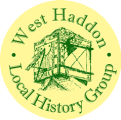Schooling In West Haddon
War-Time
During the years of The Great War the Empire Day Celebrations comprised of an address, the singing of patriotic songs and a collection to provide comforts for soldiers in the fighting line.
From the Managers log of June 24th 1914 “The Head, Mr. Br?nner applied for Leave of absence to attend Army manoeuvres at the end of July. The Managers recommended this leave be granted. October 26th 1914, an emergency Managers meeting was held. The Chairman submitted a request from Mr. Br?nner that he might be allowed leave of absence to join the Northamptonshire Yeomanry during the present crisis. Though conscious of the fact that Mr. Br?nner can ill be spared from the school, the present crisis and the needs of the Army must override local inconvenience.”
Mr Br?nner ceased being Head of the School on October 31st the end of the school year, and Mr john Dunbar of the emergency staff took charge. Unfortunately for the school Mr Dunbar was called up by the Military Authorities for a medical examination in July of 1916 and consequently had to conclude his duties as acting Head.
In November of 1917 the Juniors teacher Mrs Kennell, was allowed leave to be with her husband who was home on final leave before going overseas. Many children were absent in May of that year to attend a Naval funeral. WHO? Red Cross sales were regularly held in the hall.
On 18th June 1919 games were organised in the playground as a peace celebration. When school broke up for the harvest holiday on August 1st they were granted an extra weeks holiday as a peace celebration, by order of the King.
The Second World War had a much greater impact on the village than the Great War.
1939
West Haddon was included in arrangements for the evacuation of children from London and other towns. The school was told it could expect up to 100 evacuees, this for a school already occupied by 103 children. In September 20 children arrived from Barnsbury Central School for Girls North London, who took their lessons in the Institute. They left West Haddon for Oundle on September 15th.
A log entry from that time records Air Raid drill was taken in all classes under direct supervision of the Headmaster Mr. Latimore, who was an Air Raid Warden. On the afternoon of September 21st instead of art/craft the time was used to put the 4 rolls of tape, which had arrived, on the windows to minimise the danger of flying splinters in the event of an air raid. An emergency first-aid case also arrived along with a stirrup pump and three buckets for use in the event of fire caused by an incendiary bomb.
Further children had been evacuated to West Haddon but by December these had dwindled to just one. I wonder who?
1940
A Whist Drive was organised in March, the £6/10s raised was used to buy wool for the children to knit woollen articles for the soldiers.
On September 16th, 16 evacuees arrived from Ipswich; by the 20th there were 35 evacuees in school, 4 there by private arrangement.
In November it was recorded that many children were late to school due to heavy bombing on the Coventry side of the village. Sid Adams recalls the awful experience of hearing the enemy planes passing over to bomb Coventry. Many people came to West Haddon after they had lost their homes. Mr Shapland was in charge of finding them places to stay.
1941
In February the school Managers agreed that a room could be made available for organised fire watching if required.
When the children broke up for Easter that year, each child was given 2oz of sweets bought with money sent by a Mrs Congdon of America. When school reopened Mrs Leggett was on compassionate leave to be with her husband. The Food Controller requisitioned Miss Watson’s room on November 14th to issue food (Ration) cards.
1942
There was a threat that the school railings would be removed as salvage for war purposes. The Managers at their March meting expressed very strong views on the matter:
- Removal would be likely to endanger the children from motor traffic.
- The lavatories in the schoolyard would be liable to use and possible misuse by unauthorised persons.
The railings remained in place.
For a time during the war Mrs Evelyn Ainge ran a private school when local farmers, whose children went into Northampton, became concerned about their children being so far from home.
During the latter part of the Twentieth Century we have been returning to using herbs for health benefits, but during the War herbs were put to great use. A log note for June 18th 1942 informs us that ’this afternoon the Medicinal herbs team was taken to collect nettles whilst the remainder of the school had organised games.’
1944
In March it is noted that one dozen Bakelite beakers were received for ‘administering cod liver oil and orange juice to the Infants.’
1945
The log for August 27th records ‘Reopened after mid-summer holidays. 92 on roll (ALL NATIVES)’!
